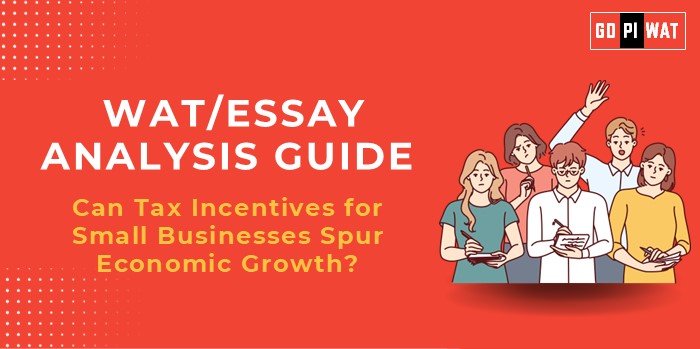📋 Written Ability Test (WAT) / Essay Analysis Guide
🌐 Topic: Can Tax Incentives for Small Businesses Spur Economic Growth?
💡 Understanding the Importance
“Tax incentives for small businesses are a double-edged sword. They can catalyze growth and innovation, but their efficacy depends on design and implementation.”
📝 Effective Planning and Writing
- Time Allocation (30 minutes):
- Reading & Planning: 5 minutes
- Writing: 20 minutes
- Review: 5 minutes
- Preparation Tips:
- Research examples of successful and unsuccessful tax incentive programs.
- Focus on specific benefits, challenges, and global comparisons.
🔖 Introduction Techniques for Essays
- Contrast Approach:
- Solution-Oriented Approach:
“While tax incentives have driven innovation and job creation in economies like Germany, their misuse in other countries has raised questions about their efficiency.”
“Tax incentives, if targeted effectively, can act as a catalyst for SME growth, innovation, and broader economic development.”
📚 Structuring the Essay Body
- Achievements:
- Challenges with Comparative Analysis:
- Future Outlook:
Highlight how tax incentives enhance SME competitiveness, attract investments, and encourage innovation (e.g., U.S., UK, and Germany).
Analyze revenue loss risks, inequality in access, and policy missteps (e.g., Brazil’s misuse of SME tax benefits).
Propose hybrid models, performance-based tax incentives, and international collaboration to maximize benefits.
🏁 Concluding Effectively
- Balanced Approach:
- Global Comparison:
“Tax incentives for small businesses can spur economic growth when carefully designed, targeted, and monitored for effectiveness.”
“Learning from countries like Germany and the U.S., governments can create tax frameworks that balance SME growth with fiscal sustainability.”
✍️ Sample Short Essays
- Balanced Perspective:
- Solution-Oriented:
- Global Comparison:
“Tax incentives can stimulate economic growth if targeted effectively, but governments must mitigate risks like misuse and revenue losses.”
“Governments should adopt performance-based tax incentives, ensuring accountability while fostering SME growth.”
“Drawing insights from Germany and the U.S., tax incentives can drive small business expansion and economic resilience when paired with robust oversight mechanisms.”


